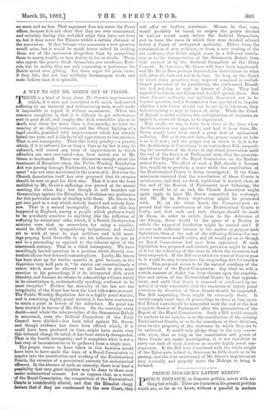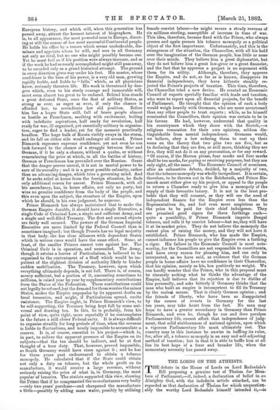PRINCE BISMARCK'S LATEST REBUFF.
PRINCE BISMARCK, in domestic politics, meets with no- thing but rebuffs. There are features in his present position which are, so far as we know, without a parallel in modern
European history, and which will, when this generation has passed away, attract the keenest interest of biographers. He is, to all appearance, the most powerful man in Europe, direct- ing at will the course of her most successful Continental people. He holds his office by a tenure which seems unshakeable, dis- misses and appoints whom he will, and sees in all Germany not only no rival, but no one who might possibly become one. Yet he must feel as if his position were always insecure, and as if the work he had so nearly accomplished might still pass away, to be recorded only as a grand historical attempt. The ground in every direction gives way under his feet. His master, whose confidence is the base of his power, is a very old man growing rapidly feeble, and liable to "falls," which, as all Physicians know, seriously threaten life. His work is threatened by dan- gers which, even to his steely courage and immovable will, must seem almost too great to be endured. Behind him stands a great defeated State, once the first of military States, as strong as ever, as eager as ever, if only the chance is afforded her, to revindicate her old position. Before him lies a huger State still, full of brave people almost as hostile as Frenchmen, seething with excitement, boiling with indefinite aspirations, half ready for revolution, half ready for war, ill organised, yet essentially military in organisa- tion, eager to find a leader, yet for the moment practically headless. The huge bulk of Russia visibly sways in the storm, and its fall on either side would endanger all around. Prince Bismarck expresses supreme confidence, yet not even he can look forward to the chance of a struggle between Slav and German, if it be only a chance, without a qualm, or without remembering the price at which, in all the battles of history, German or Frenchman has prevailed over the Russian. Grant that the danger proves unreal, it is not in mortal power to be sure of its unreality ; and it is a great possible calamity, rather than an advancing danger, which tries a governing mind. And if he seeks relief at home from the foreign situation, he finds only additional reason for unrest. Prince Bismarck, with all his ascendancy, has, in home affairs, not only no party, but wins no genuine confidence from the body of the people, and this even upon the subject, the structure of the Empire, upon which he should, in his own judgment, be supreme. Prince Bismarck has always maintained that to make the German Empire durable, it should have a single Executive, a single Code of Criminal Law, a single and sufficient Army, and a single and well-fflled Treasury. The first and second objects are fairly well secured. The powers of the German Imperial Executive are more limited by the Federal Council than is sometimes imagined; but though Prussia has no legal majority in that body, she has close alliances with dependent States which in serious cases would have the same effect. Some, at least, of the smaller Princes cannot vote against her. The Criminal Code is in operation, and unassailed. The Army, though it retains a leaven of Particularism, is believed to be organised to the contentment of a Staff which would be im- patient of the slightest division of authority likely to hinder sudden mobilisation. The Treasury, however, upon which everything ultimately depends, is not full. There is, of course, money sufficient, but a portion of it, amounting sometimes to millions, is raised year by year by supplementary contributions from the States of the Federation. These contributions could not legally be refused,but the demand for them worries the minor States, makes the Empire unpopular by its apparent drafts on local treasuries, and might, if Particularism spread, excite resistance. The Empire ought, in Prince Bismarck's view, to be self-supporting, the Treasury being kept full by some uni- versal and drawing tax. In this, he is probably, from his point of view, quite right, more especially if he contemplates in the future a still closer Federal unity. It is always difficult to organise steadily for long periods of time, when the revenue is liable to fluctuations, and nearly impossible to accumulate a reserve. It is, of course, essential to his project—which is, in part, to relieve the apparent pressure of the Empire on its subjects—that the tax should be indirect, and he at first thought of a beer duty. That, however, proved impossible, as South Germany would have risen against it ; and he has for three years past endeavoured to obtain a tobacco monopoly. He calculated that if the State could obtain not only a daty on tobacco, bat the whole profit on its manufacture, it would receive a large revenue, without seriously raising the price of what is, in Germany, the most
popular of luxuries. The statists supported this view, showing the Prince that if ho compensated the manufacturers very badly
—only two years' purchase—and cheapened the manufacture a little—possibly by adding more water, possibly by utilising female convict labour—he might secure a steady revenue of six millions sterling, susceptible of increase in time of war. This idea, therefore, became fixed with the Prince, who always presses and again presses his tobacco monopoly as a political object of the first importance. Unfortunately, and this is the strangeness of the situation, the Chancellor, with all his hold over the imagination of the German people, has little or none over their minds. They believe him a great diplomatist, but they do not believe him a great law-giver or a great financier, and the fact that he approves a project is no argument with
them for its utility. Although, therefore, they approve the Empire, and do not, so far as is known, disapprove its financial independence, they have hitherto steadily re- jected the Prince's projects of taxation. This time, therefore, the Chancellor tried a new device. He created an Economic Council of experts specially familiar with trade and taxation, who were to report upon all financial projects, for the benefit of Parliament. He thought that the opinion of such a body would weigh heavily with Germans, who are more accustomed than any other people to trust experts ; while, as he himself nominated the Councillors, their opinion was certain to be in his favour. He had, however; underrated that quality in his countrymen which they share with the Scotch,—a religious veneration for their own opinions, seldom dis- tinguishable from mental independence. Germans would, we believe, obey a law ordering them to cast up their sums on the theory that two plus two are five, bat as to declaring that they are five, or still more, thinking they are five, they will not do it on any provocation, or for any reward. "Of course, if the Herren please, four marks and four marks shall be ten marks, for paying or receiving purposes, bat they are only eight, all the same." The Economic Council of nominees, after an exhaustive debate, decided, by a majority of two, that the tobacco monopoly was wholly inexpedient. It is certain, therefore, to be thrown out in the Reichsrath, and Prince Bis- marck must either give up his project, or appeal to the people to return a Chamber ready to give him a monopoly of the supply of their favourite luxury. It is not in the least pro- bable that they will consent, as they will see the need of independent finance for the Empire even less than the Representatives do, and feel even more suspicious as to the price to be paid for their chief indulgence. They are promised good cigars for three farthings each— quite a possibility, if Prince Bismarck imports Bengal tobacco, and rolls it by convict labour—but no, they will have it at its market price. They do not believe the monopoly the
easiest plan of raising the money, and they will not have it established. Prince Bismarck, who has made the Empire, cannot influence his people to give the Empire even a farthing a cigar. His failure in the Economic Council is most note- worthy, for the Councillors are not responsible to constituents, and have every reason for pleasing him, and can only be interpreted, as we have said, as evidence that the German people in home affairs have no confidence in their Chancellor, that his opinion, merely as his, has positively no weight. We can hardly wonder that the Prince, who in this proposal must be sincerely seeking what he thinks the advantage of the Empire, half believes that its rejection is due to dislike of him personally, and asks bitterly if Germany thinks that the man who built an empire is incompetent to fill its Treasury by the easiest means. That is clearly German opinion ; and the friends of liberty, who have been so disappointed by the course of events in Germany for the last ten years, may take heart from the fact. No man may hope to have a greater ascendancy in Germany than Prince Bismarck, and even he, though he can and does paralyse Parliamentary life, cannot affect that independence of judg- ment, that solid stubbornness of national opinion, upon which a vigorous Parliamentary life must ultimately rest. The country may in this instance be unwise in baffling its ruler, for, after all, a tobacco monopoly is an easy and self-adjusting method of taxation; but in that it is able to baffle him at all lies its best hope of a freer and broader life, when the momentary necessity has passed away.



































 Previous page
Previous page